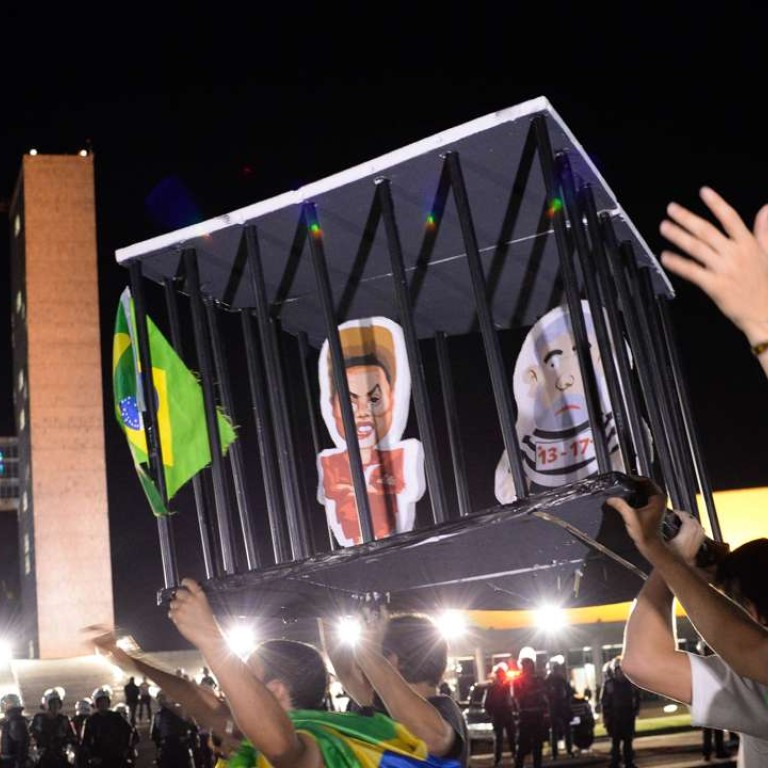
What Brazil’s turmoil says about corruption in emerging markets from South Africa to Malaysia
It takes a brave investor to be bullish on Brazil.
What began two years ago as an investigation into a bribery scandal at Petrobras, the country’s state-run oil company, has since morphed into a debilitating political, economic, financial and constitutional crisis.
The scandal, dubbed “Car Wash”, in which dozens of prominent business executives and politicians have been arrested (or are under investigation) on suspicion of inflating the value of Petrobras contracts and using part of the proceeds to pay for bribes and electoral campaigns, has helped pull the rug out from under Brazil’s economy, severely undermining what was perceived to be one of the greatest emerging market (EM) success stories.
Last year, Brazil’s economy shrank nearly 4 per cent – and nearly 6 per cent in the final quarter – compared with a growth rate of 7.5 per cent in 2010. Not only is Latin America’s largest economy suffering its worst recession since the 1930s, the end of the commodity supercycle, which fuelled Brazil’s growth in the first decade of this century, has exposed long-standing economic vulnerabilities which the ruling Workers’ Party conspicuously failed to address.
Not surprisingly, Brazilian assets have taken a pounding over the past few years.
Since September 2014, the real, Brazil’s currency, has lost a whopping 60 per cent against the dollar. The Ibovespa, Brazil’s main equity index, is down 17 per cent and the yield on Brazil’s 10-year local bond has shot up nearly 300 basis points to 14 per cent.
Yet hope springs eternal, and right now investors are seeing light at the end of the tunnel.
The prospect of a change of government – efforts to impeach Dilma Rousseff, Brazil’s embattled president, have gathered pace since her controversial decision last week to nominate her mentor and predecessor, Luiz Inacio Lula da Silva, as her chief of staff despite efforts by state prosecutors to arrest Lula on money laundering charges – has buoyed sentiment towards Brazil.
Since the end of last month, the real has strengthened 10 per cent against the dollar, the Ibovespa has surged 23 per cent and the yield on Brazil’s 10-year domestic debt has fallen nearly 200 basis points.
Make no mistake, the rally in Brazilian markets over the past month or so represents one of the most dramatic improvements in sentiment in EMs in recent memory.
The question is whether investors are getting ahead of themselves given the severity of Brazil’s political and economic crisis.
Not only is a change of regime likely to be an extremely messy affair – the recent demonstrations and protests across Brazil suggest there is ample scope for violent confrontations – it is unclear whether a new government would be politically able to implement much-needed fiscal and structural reforms, particularly given the depth of Brazil’s recession.
Still, there are reasons to be cautiously optimistic about Brazil.
Unlike other corruption-tainted EMs, in particular South Africa and Malaysia, strenuous efforts are being made to root out corruption, one of the biggest impediments to growth.
Brazil’s criminal justice system, which for decades was rightly perceived as toothless and pliant, is now taking on the country’s corrupt politicians and business leaders, demonstrating the resilience and independence of the country’s institutions at a critical time for Brazil and just months before the summer Olympics kick off in Rio de Janeiro.
This is in stark contrast to South Africa where the country’s president, Jacob Zuma, is doing little to assuage mounting concerns about cronyism and corruption centred around his ties to the Gupta family. South Africa’s new finance minister, the respected Pravin Gordhan, is struggling to assert his authority amid attempts by a special policy agency to discredit him.
Meanwhile in Malaysia, premier Najib Razak remains mired in an escalating corruption scandal surrounding 1MDB, the country’s state investment fund. Najib, who has been cleared by Malaysia’s attorney-general of any wrongdoing over payments of US$680 million that ended up in his bank account, still had to go as far saying that he is “not a crook” last weekend in a sign of the extent to which his authority has been undermined.
While Brazil’s economy is in much worse shape than Malaysia’s – and even South Africa’s, which is saying something – the fight against corruption is making headway, which is no mean feat.
Nicholas Spiro is a partner at Lauressa Advisory

